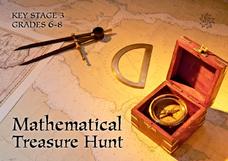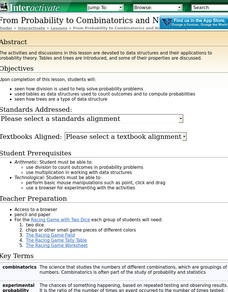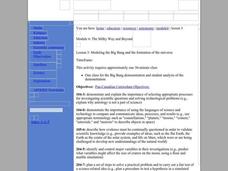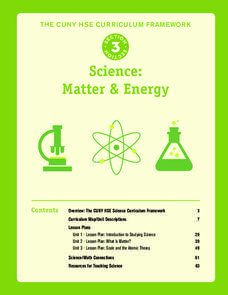National Gallery of Canada
Mastering One-Point Perspective
Cover one-point perspective through observation and practice. Class members examine several works of art that use one-point perspective, look at magazine images to find the vanishing points and horizon lines, and draw their own city...
Steinhardt Apps
Kinetic Molecular Theory
Building off young chemists' knowledge of the states of matter, kinetic molecular theory is the focus of the unit. Eight days of lessons including multiple demonstrations, one lab experiment, directed instruction, and worksheets,...
Virginia Department of Education
Modeling the Big Bang Theory
Young astronomers learn about the Big Bang Theory and redshift through a hands-on activity in the last installment of a three-part series. Participants draw dots on balloons and then inflate them to model how galaxies moved farther apart...
Science Geek
Kinetic Molecular Theory
The fourth presentation in a series of five begins with information about the nature of gases and what to expect from them. Then it discusses kinetic molecular theory, diffusion, and Graham's Law, and concludes with the purification of...
Curated OER
Mathematical Treasure Hunt
The hunt is on! Young mathematicians follow clues and complete a series of ten math puzzles as they try to crack Dr. Integer's code and find the location of his hidden treasure.
Code.org
One-way Functions – The WiFi Hotspot Problem
Pupils attempt to solve the Wireless Hotspot Problem and learn why it is considered a computationally hard problem in the ninth lesson of the series on 12. They also learn about one-way functions and how the Wireless Hotspot Problem is...
Curated OER
Theory, Theory, Who's got the theory?
Students analyze 5 separate theories of evolution in order to help them explain the different meanings of theory, how human values influence science, and that the scientific view of the origin of life does not involve supernatural forces.
Curated OER
Divisibility Rules Using Scientific Calculators
Young learners apply divisibility rules to determine if a number is a factor of another number. They discuss what numbers are factors of another number and identify patterns using divisibility rules.
Shodor Education Foundation
From Probability to Combinatorics and Number Theory
What middle schooler does not enjoy an occasional online game? In this instructional activity play, you will find embedded links to an online probability game, and informative pages about how division is used in probability, the concept...
Virginia Department of Education
The Germ Theory and Koch’s Postulates
Explore the history of cholera and its effect on society with your biology class. Young biologists will then proceed to grow their own germs, prepared from live cultures, and follow the steps of the scientific method to generate data....
Curated OER
Atomic Theory
An extremely thorough presentation walks new chemists through the basics of matter. There really isn't a unifying theme, however So many topics are covered: forces, elements, atomic structure, chemical properties, compounds, quarks,...
Curated OER
Two-Step Problems and Money Concepts
Elementary schoolers solve two-step equations and practice money concepts. They solve multi-step addition and subtraction contextual problems and apply money concepts to real life situations. Pupils use pictures and counters to help them...
Adrian College
The Universe
Young scientists create a simulation of Hubble's law. Introducing the Big Bang Theory using balloons and a simple lab worksheet, scholars complete a data table and perform analysis.
Curated OER
Theories, Hypothesis, Laws, Facts & Beliefs
For this scientific statements worksheet, students are given 35 statements and they are to identify if each statement is a fact, law, hypothesis, theory or belief.
Curated OER
The Big Bang Theory
Students will use scientific reasoning to formulate ideas about the formation of the universe using the Big Bang Theory. The use of critical thinking skills is part of the activity and the foundation of the scientific method will serve...
Virginia Department of Education
The Particle Theory of Matter
Demonstrate the particle theory of matter to high school scientists with an engaging experiment that allows them to visually see the results as substances change from one state to another. The class concludes with a discussion about how...
Curated OER
Phase Changes of Water
A micro-unit on the phase changes of water includes three laboratory activities. Junior scientists compare the densities of ice and water, and then they do the same for cold and warm water. They examine freezing and boiling temperatures....
Curated OER
Understanding Behavior of Gases
If you want your young chemists to fully grasp the behavior of gases, here is an all-inclusive lesson plan. It provides handouts of detailed instructions for three laboratory activities, assessment reccomendations, and a list of...
Curated OER
Chalkboard Challenge: 5th Grade Math Review
This math review PowerPoint engages fifth grade students in an interactive review of math concepts. This review game includes questions on numeration, data interpretation and number theory. This is in a "Jeopardy" style format.
Curated OER
Understanding the Basics of the Behaviorist Theory
Ideas gleaned from the behaviorist theory may help equip you with classroom management tools.
Curated OER
Number Theory: The Sieve of Eratosthenes
In this number theory activity, students read about The Sieve of Eratosthenes and follow a set of directions to complete a prime number activity and answer 4 related questions.
Curated OER
Development of the Atomic Theory
In this atomic theory worksheet, students complete a paragraph describing the development of the atomic theory by filling in the blank with 21 terms.
Curated OER
Science: Matter and Energy
Designed to use when teaching adults preparing for their high school equivalency exam, the resource integrates reading practice, writing, and analytical thinking in every lesson. The unit covers 23 topics, but it only includes three...
Curated OER
Number Theory Worksheet 2: The Sieve of Eratosthenes
In this primes and multiples activity, students follow the directions to circle primes and multiples on a hundred chart until all prime numbers from 1 to 100 are circled. This is called the Sieve of Eratosthenes.
Other popular searches
- Math Number Theory
- Number Theory and Operations
- Number Theory 1
- Number Theory Rounding
- Number Theory Ed Helper
- Number Theory Ii
- Number Theory Edhelper
- Number Theory Concepts
- Number Theory Lesson Plans
- Math + Number Theory
- Egypt Math Number Theory
- Color Tiles Number Theory

























